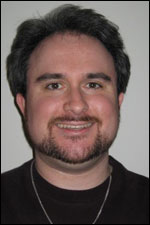Master’s Student Wins Google Policy Fellowship to Study Internet Policy in Washington, D.C.
Columbia, Mo. (March 12, 2009) — Missouri School of Journalism graduate student Bryan Utter has won a prestigious 2009 Google Policy Fellowship. Utter, who is enrolled in the journalism-law dual-degree program, will complete his master’s project at Media Access Project (MAP) in Washington, D.C. He also is a second-year student at the University of Missouri School of Law.

The Google Policy Fellowship offers law students an opportunity to explore Internet policy. Utter will spend from June to August working for MAP, a non-profit organization that promotes the public’s First Amendment right in digital media.
Utter’s work at MAP – legal researching, writing and administrative proceedings – dovetails with his career goal of protecting free speech.
“I’m really excited about doing this kind of work, because it’ll give me the kind of real-world experience that law students look for in a summer position,” he said. “Rather than working for a firm, I’ll be working for an organization focused on First Amendment issues.”
Utter also says that he is a firm believer in the need to protect the right of the public to access information on the Internet without government interference.
He learned about the Google fellowship from Associate Professor Charles Davis who frequently sends items of interest along to his students. Davis also serves as executive director for the National Freedom of Information Coalition, which is headquartered at the School and seeks to protect the public’s right to oversee its government.
Utter anticipates this fellowship will give him the opportunity to use his educational experience in both law and journalism in a substantive way. “Working in the public interest is what I plan to do after graduating,” he said. “It’ll be great to see, first hand, what public interest law is all about and to make my own contribution while doing so.”
The graduate journalism-law options available at the University of Missouri prepare students for specialty careers in media and law. The program can be tailored to meet each student’s personal career goals. In addition to working with NFOIC, students can be involved in the School of Law’s Center for the Study of Dispute Resolution, which is considered the nation’s best.
Updated: April 30, 2020